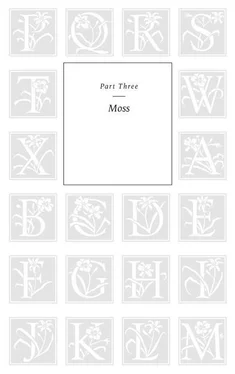Vanessa Diffenbaugh - The Language of Flowers
Здесь есть возможность читать онлайн «Vanessa Diffenbaugh - The Language of Flowers» весь текст электронной книги совершенно бесплатно (целиком полную версию без сокращений). В некоторых случаях можно слушать аудио, скачать через торрент в формате fb2 и присутствует краткое содержание. Жанр: Старинная литература, на английском языке. Описание произведения, (предисловие) а так же отзывы посетителей доступны на портале библиотеки ЛибКат.
- Название:The Language of Flowers
- Автор:
- Жанр:
- Год:неизвестен
- ISBN:нет данных
- Рейтинг книги:4 / 5. Голосов: 1
-
Избранное:Добавить в избранное
- Отзывы:
-
Ваша оценка:
- 80
- 1
- 2
- 3
- 4
- 5
The Language of Flowers: краткое содержание, описание и аннотация
Предлагаем к чтению аннотацию, описание, краткое содержание или предисловие (зависит от того, что написал сам автор книги «The Language of Flowers»). Если вы не нашли необходимую информацию о книге — напишите в комментариях, мы постараемся отыскать её.
The Language of Flowers — читать онлайн бесплатно полную книгу (весь текст) целиком
Ниже представлен текст книги, разбитый по страницам. Система сохранения места последней прочитанной страницы, позволяет с удобством читать онлайн бесплатно книгу «The Language of Flowers», без необходимости каждый раз заново искать на чём Вы остановились. Поставьте закладку, и сможете в любой момент перейти на страницу, на которой закончили чтение.
Интервал:
Закладка:
12 .
“I missed you today,” Elizabeth said when I walked into the room .
She didn’t ask where I’d been, and I didn’t offer an explanation. I crawled into bed, pulling the covers up over my head and rolling onto my side, my back to the desk where she sat.
“I love you, Victoria,” she said quietly. “I hope you know that.” The first time she’d declared her love, I’d believed her. Now her words ran over my heart like water over a stone. The desk chair scraped against the wood floor as she stood, and I felt the mattress dip as she moved to the edge of the bed. She placed one hand on my shoulder.
“What did she do?” I asked.
The question was sudden and unplanned, and I felt Elizabeth’s body flinch. She was quiet for a long time. Finally, she lay down on her back next to me.
“I loved a man, once,” she said simply. “It was a long time ago. He was English, here for an internship with one of the bigger wineries, just a few miles up the road. I was happier than I’d ever been. And then Catherine—my sister, my best friend—took him away from me.”
Elizabeth rolled onto her side and draped her arm over my body. I stiffened but did not protest, waiting for her to continue. “A year later, Grant was born. For years I couldn’t look at him without remembering his father, without replaying in my mind everything I’d lost. But his father was gone; I don’t know if he ever knew Catherine was pregnant. She raised Grant completely alone.”
Elizabeth inched closer until her bent legs tucked into the space behind my kneecaps. When she spoke next, her face was pressed into the blanket covering the top of my head so that I had to strain to hear her words.
“I had a chance to forgive her,” she whispered. “Once, when Grant was still a baby, Catherine approached me at the farmers’ market. She apologized, crying, and told me how much she missed me. It was my chance to have her back in my life, but instead I turned her away. I shouldn’t have done it. I said awful things, things that keep me up at night.”
She deserved it , I thought. Catherine deserved everything Elizabeth had said and more. The idea that Elizabeth was about to move in to the home of the woman who had betrayed her made my chest fill with rage. I took a deep breath, willing myself to be patient.
For what seemed like hours, I waited for Elizabeth to speak, tense in her gentle grasp. But she was quiet, her story complete. Just as I began to worry that she had fallen asleep, she stood up and tiptoed out of the room. The faucet in the bathroom sink turned on and off, the toilet flushed, her bedroom door closed, and then all was quiet. I slipped out of bed.
Downstairs, I sneaked through the kitchen and out the back door. The canvas bag was underneath the steps where I had stashed it, full and heavy. I picked it up and hugged it to my chest. Inside, the glass jars clattered and resettled.
I had decided earlier, crouched in the ditch, exactly where I would go, and I walked quickly in the direction of the road. There was no moon, but the stars illuminated the property as I walked to the northeast corner. Here, wedged between the concrete of the farmers’ market and the highway, the grapes were dusty and constantly dry. In the fall, they remained sour long after the other acres had ripened.
I unscrewed the lid of the first jam jar. Lighter fluid seeped over the edges and spiraled through the ridges at the lip of the glass. Slowly, I emptied it onto the trunk of the vine, holding the jar away from my body, so the fluid wouldn’t run back to my bare toes. When the first jar was empty, I opened the second, moving down the row. The bag felt bottomless, and I began to move quickly, sloppily, the lighter fluid a wild spray from my hands to the vines. When I reached the end of the row, I retraced my steps, picking up the empty jars that littered the ground.
On the top porch step—in the same place Elizabeth and I had once sat, stringing chamomile—I lined up the jam jars, one after the other, and then went into the kitchen for matches.
I started back toward the road, looking for the wet trail. It ended by the driveway. I stepped back. Holding a fistful of matches together, I struck them on the wide, sandpapery strip of the box. One lit, and the others followed in a rush, until I held a flickering, glowing orb. The flame descended toward the tips of my fingers, and I waited until the heat grew uncomfortable, and then painful, before flicking it onto the ground.
There was a pause, and then a rushing noise—like a river, tumbling—followed by a quick series of loud pops. Then the heat. Turning, I ran toward the house, as I had planned, for a pot of water. But the fire was faster than I was. Looking over my shoulder, I saw the flames fleeing away from me, following an invisible trail through the brush and vines. I had expected the fire to be contained to the trunks of the vines I’d soaked, to flicker there until I ran inside for buckets of water, but the fire didn’t wait.
I leapt up the steps three at a time, racing into the kitchen. Replacing the matches, I screamed for Elizabeth. She rose immediately. I heard her thumping into my bedroom, calling my name.
“Downstairs!” I yelled. I was at the sink, filling a soup pot with water. The pipes of the old house clanked, and water emerged slowly, in breathy waves.
Clutching the full pot, I crossed the kitchen at the same moment Elizabeth descended the stairs, and we turned, shoulder to shoulder, our gaze drawn to the light.
The sky was purple. The stars were gone. As we watched, the fire dipped into the roadside ditch, a quarter-mile of dry thistle igniting in a single moment. The wall of flames that rose seemed to climb halfway to the sky. Beyond it, the surrounding properties disappeared, leaving Elizabeth and I completely alone.
Like electricity on wires, the fire spread in lines across the vineyard.
13 .
I awoke when the sun rose. My body was sore, my cheek textured with the imprint of the forest. I’d slept six hours, maybe seven. Pushing up into a sitting position, I adjusted myself away from the two circular puddles under the heath.
The city was waking up. Engines sputtered to life, brakes screeched, birds sang. On the street below me, a school-age girl stepped off a bus. She was alone and walked quickly down the street, a bouquet of flowers in her hands. I couldn’t see what she carried.
I exhaled. I wanted more than anything to be that girl, to be a child again and carry crocus or hawthorn or larkspur instead of buckets of thistle. I wanted to search the North Bay until I found Elizabeth, and apologize, and beg forgiveness. I wanted to start my life over, on a course that would not lead to this moment, this waking up alone in a city park, my own daughter alone in an empty apartment building. Every decision I’d ever made had led me here, and I wanted to take it all back, the hatred and the blame and the violence. I wanted to have lunch with my angry ten-year-old self, to warn her of this morning and give her the flowers to point her in a different direction.
But I couldn’t go back. There was only now: this forest within a city and my own daughter, waiting. The thought filled me with dread. I did not know what I would find when I returned to the apartment. I did not know if she still screamed, or if time, solitude, and hunger had collapsed my daughter’s lungs as completely as a rising tide.
I had failed my daughter. Less than three weeks after giving birth and making promises to us both, I had failed, and failed again. The cycle would continue. Promises and failures, mothers and daughters, indefinitely.
14 .
My arms began to shake violently, water from the soup pot sloshing onto Elizabeth. The cold spray snapped her into action. She ran to the phone in the kitchen as I sprinted out the front door, tripping over the jam jars as I flew down the steps.
Читать дальшеИнтервал:
Закладка:
Похожие книги на «The Language of Flowers»
Представляем Вашему вниманию похожие книги на «The Language of Flowers» списком для выбора. Мы отобрали схожую по названию и смыслу литературу в надежде предоставить читателям больше вариантов отыскать новые, интересные, ещё непрочитанные произведения.
Обсуждение, отзывы о книге «The Language of Flowers» и просто собственные мнения читателей. Оставьте ваши комментарии, напишите, что Вы думаете о произведении, его смысле или главных героях. Укажите что конкретно понравилось, а что нет, и почему Вы так считаете.












